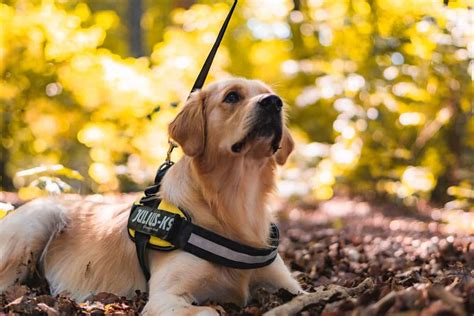Understanding the Role of Therapy Dogs
Therapy dogs play a vital role in the well-being of individuals facing various physical and emotional challenges. These specially trained canines provide comfort, support, and companionship to those in need. Understanding the role of therapy dogs and the impact they have on people’s lives is crucial in appreciating their significance in therapy settings.
Therapy dogs possess several key traits and characteristics that make them well-suited for this important role. They are typically friendly, patient, calm, and have a gentle temperament. These characteristics allow therapy dogs to interact effectively with different individuals, including children, the elderly, and those with disabilities.
Labrador Retrievers are often considered one of the top choices for therapy work. Their friendly and outgoing nature, combined with their intelligence and trainability, make them excellent therapy dogs. They are known for their ability to provide emotional support and assistance in a variety of therapy settings, including hospitals, schools, and nursing homes.
Golden Retrievers, with their gentle and trustworthy disposition, are also widely recognized as exceptional therapy dogs. Their patient and nurturing nature allows them to form strong connections with individuals, providing comfort and companionship during challenging times. Their versatility makes them a popular choice for therapy work.
Key Traits and Characteristics for Therapy Dogs
Therapy dogs play a vital role in providing comfort, support, and affection to individuals in various settings, such as hospitals, nursing homes, schools, and rehabilitation centers. These dogs possess certain traits and characteristics that make them well-suited for this important work. Understanding the key traits required for therapy dogs can help in selecting and training these special animals for their rewarding role.
1. Temperament: One of the most crucial traits for therapy dogs is a calm and friendly temperament. These dogs should be naturally gentle, patient, and trustworthy. They must be able to remain calm in challenging situations and not be easily startled or aggressive. A therapy dog should be comfortable around people of all ages and be able to handle various encounters with individuals who may have disabilities or be in distress.
2. Socialization: Socialization is essential for therapy dogs as they will encounter a diverse range of people, objects, and environments. A well-socialized therapy dog should be exposed to different situations, noises, and experiences from an early age. This helps them become more adaptable and confident in unfamiliar settings. Dogs that are properly socialized are more likely to handle the unpredictable nature of their therapy work with ease.
3. Obedience and Training: Therapy dogs must be trained to follow basic obedience commands reliably. They should be easy to control and responsive to their handler’s cues. Training also includes important skills such as walking politely on a leash, sitting or lying down on command, and refraining from jumping or excessive licking. A well-trained therapy dog will ensure a safe and positive therapeutic experience for both the dog and the individuals they interact with.
| Trait | Description |
|---|---|
| Empathy | Therapy dogs should demonstrate empathy towards individuals, being able to gauge their emotions and respond accordingly. |
| Physical Health | Therapy dogs must be in good physical health, as they may need to engage in physical activities during their visits. |
| Patient | These dogs need to display patience, as their job may involve waiting for extended periods or being exposed to challenging situations. |
| Tolerance | Therapy dogs should possess a high level of tolerance towards various behaviors and stimuli, including loud noises or sudden movements. |
When considering a dog for therapy work, it is important to keep in mind that not all dogs possess the suitable temperament or characteristics required. Breeds such as Labrador Retrievers, Golden Retrievers, Poodles, Cavalier King Charles Spaniels, and Bernese Mountain Dogs are often well-suited for therapy work due to their gentle nature, intelligence, and versatility. However, it is crucial to remember that individual personality and behavior can vary within each breed.
Overall, therapy dogs bring immense joy, comfort, and companionship to countless individuals who may be facing difficult circumstances. Selecting dogs with the key traits and characteristics suitable for this role, along with proper training, ensures a positive and impactful therapy experience for everyone involved.
Labrador Retriever: A Top Choice for Therapy Work
A Labrador Retriever is considered to be one of the top choices when it comes to therapy work. These dogs possess a unique set of traits and characteristics that make them ideal for this important role. They are known for their friendly and outgoing nature, as well as their intelligence and willingness to please. Labradors have a natural instinct to offer comfort and support to those in need, making them perfect candidates for therapy work.
One key trait of Labrador Retrievers is their gentle and calm demeanor. These dogs have a remarkable ability to remain composed in stressful or emotionally charged situations. This allows them to provide a sense of tranquility and comfort to individuals who may be experiencing anxiety, fear, or sadness. Their presence alone can have a soothing effect, helping to create a peaceful and relaxing atmosphere.
Labradors are also highly intelligent and trainable. This makes them well-suited for therapy work, as they can quickly learn and understand various commands and tasks. Whether it’s sitting quietly beside a patient, fetching an item, or performing simple tricks to bring a smile to someone’s face, Labrador Retrievers are capable of adapting to a wide range of therapy roles and activities.
- Friendliness and sociability: Labradors are known for their friendly and sociable nature, making them easily approachable and relatable to people of all ages. Their warm and welcoming demeanor helps to create a positive and engaging environment during therapy sessions.
- Physical capabilities: Labradors are active and energetic dogs, which means they can handle the physical demands of therapy work. They are strong and agile, able to move around easily and provide physical support if necessary.
- Adaptability: Labradors are highly adaptable and can adjust to different environments and situations. Whether it’s in a hospital, nursing home, school, or rehabilitation center, these dogs have the ability to adapt to various settings and interact with diverse groups of people.
| Traits | Characteristics | Benefits |
|---|---|---|
| Friendly | Easily approachable and relatable | Creates a positive and engaging therapy environment |
| Intelligent | Capable of learning and understanding commands | Allows for the performance of various therapy tasks and activities |
| Gentle | Calm and composed demeanor | Provides a sense of tranquility and comfort during therapy sessions |
Golden Retriever: A Gentle and Trustworthy Companion
The Golden Retriever is well-known for its gentle and trustworthy nature, making it an excellent choice for therapy work. These dogs possess a variety of key traits and characteristics that make them exceptional companions and support animals for those in need. Whether it’s providing comfort to individuals with emotional or physical challenges, or offering a calming presence in stressful situations, Golden Retrievers have proven time and again why they are a popular choice for therapy work.
One of the key traits that sets the Golden Retriever apart is their gentle nature. These dogs have a natural inclination towards being kind and understanding, which makes them perfect for working with individuals who may be experiencing anxiety, depression, or other emotional difficulties. Their inherent gentleness allows them to form strong bonds with humans and provide the necessary support and comfort that is often needed in therapy settings.
Another characteristic that makes Golden Retrievers ideal for therapy work is their trustworthy nature. Trust is a crucial aspect of any therapeutic relationship, and these dogs excel in gaining the trust of those they work with. Their non-judgmental presence and unconditional love create a safe environment where individuals feel secure expressing their emotions and sharing their experiences. Golden Retrievers have an innate ability to sense and respond to the needs of others, further building trust and strengthening the therapeutic bond.
In summary, the Golden Retriever’s gentle and trustworthy nature make them exceptional companions for therapy work. Their key traits and characteristics allow them to provide comfort, support, and a calming presence to those in need. If you’re considering a therapy dog, look no further than the Golden Retriever – a breed that has proven time and again to be a gentle and trustworthy companion.
Key Traits and Characteristics:
- Gentle nature
- Trustworthy
- Non-judgmental
- Unconditional love
- Ability to sense and respond to the needs of others
Table: Golden Retriever vs. Other Therapy Dogs
| Golden Retriever | Labrador Retriever | Poodle | Cavalier King Charles Spaniel | |
|---|---|---|---|---|
| Gentle Nature | Yes | Yes | Yes | Yes |
| Trustworthy | Yes | Yes | Yes | Yes |
| Non-judgmental | Yes | Yes | Yes | Yes |
| Unconditional Love | Yes | Yes | Yes | Yes |
| Ability to sense and respond to the needs of others | Yes | Yes | Yes | Yes |
Poodle: Intelligent and Versatile Therapy Dogs
A Poodle is an intelligent and versatile breed that has been increasingly recognized for its suitability as a therapy dog. Therapy dogs play an important role in providing support and comfort to those in need, including individuals in hospitals, nursing homes, schools, and other settings. With their unique combination of intelligence, trainability, and gentle nature, Poodles make excellent therapy dogs and are highly valued for their ability to connect with and improve the emotional well-being of people they interact with.
One key trait that sets Poodles apart as therapy dogs is their high level of intelligence. Poodles are known for being one of the most intelligent dog breeds, ranking second in Stanley Coren’s book “The Intelligence of Dogs.” Their intelligence allows them to quickly learn and understand commands, which is crucial when working with individuals who may have specific needs or require assistance. This intelligence also enables them to make informed decisions and adapt to different situations, making them versatile and reliable therapy partners.
Additionally, Poodles possess many other characteristics that make them well-suited for therapy work. Their friendly and outgoing nature, combined with their calm and gentle demeanor, helps to create a positive and soothing environment for those they interact with. Poodles are also known for their patience and tolerance, which are vital qualities when working with individuals who may have physical or emotional challenges. Their hypoallergenic coat, which is non-shedding and has minimal dander, makes them an ideal choice for individuals with allergies or respiratory sensitivities.
Main traits and characteristics of Poodles as therapy dogs:
- Intelligence: Poodles are highly intelligent and quick learners.
- Friendly and outgoing: They have a friendly and sociable nature, making them approachable to people of all ages.
- Calm and gentle: Poodles have a calm and gentle demeanor, creating a soothing environment.
- Patience and tolerance: They are patient and tolerant, especially important when working with individuals with specific needs or challenges.
- Hypoallergenic coat: Poodles have a non-shedding coat, making them suitable for individuals with allergies or respiratory sensitivities.
In conclusion, Poodles are intelligent and versatile therapy dogs that possess the necessary qualities to provide support and comfort to those in need. Their high level of intelligence, combined with their friendly and gentle nature, make them well-suited for working with individuals of all ages and with various needs. Whether it’s in hospitals, nursing homes, schools, or other settings, Poodles have proven to be exceptional therapy companions, improving the emotional well-being of those they encounter. Their hypoallergenic coat is an added bonus for individuals with allergies or respiratory sensitivities. If you’re considering a therapy dog, a Poodle should definitely be at the top of your list.
Cavalier King Charles Spaniel: Affectionate and Calming
A Cavalier King Charles Spaniel is a breed of small spaniel known for its affectionate and calming nature. These dogs have a rich history and were originally bred as companion animals for royalty and nobility. Today, they are popular as therapy dogs due to their gentle temperament and ability to provide emotional support to those in need.
One of the key traits of a Cavalier King Charles Spaniel is their affectionate nature. They are known for their loving and gentle disposition, making them excellent therapy dogs. Their natural instinct to provide comfort and companionship makes them ideal for providing emotional support to people suffering from various mental health issues, such as anxiety, depression, and PTSD.
In addition to being affectionate, Cavalier King Charles Spaniels are also known for their calming presence. Their peaceful demeanor and ability to sense and respond to the emotions of others make them effective at reducing stress and anxiety. These dogs have a calming effect on their human companions, helping them to relax and find comfort during difficult times.
- Affectionate nature
- Calming presence
- Ability to provide emotional support
- Gentle temperament
- Instinct to comfort and companionship
| Traits | Characteristics |
|---|---|
| Affectionate nature | Loving and gentle disposition |
| Calming presence | Reduces stress and anxiety |
| Emotional support | Provides comfort during difficult times |
| Gentle temperament | Sensitive to the emotions of others |
| Instinct to comfort and companionship | Helps people relax and find comfort |
Bernese Mountain Dog: A Soothing and Comforting Presence
When it comes to therapy dogs, there are many different breeds that excel in providing comfort and support to those in need. One such breed is the Bernese Mountain Dog. With their gentle nature and calm demeanor, these dogs have become a popular choice for therapy work.
The Bernese Mountain Dog is known for its large size and striking appearance. With their beautiful tri-colored coat and friendly expression, they are hard to resist. But it is their temperament that truly sets them apart as therapy dogs. Bernese Mountain Dogs are known for being calm, patient, and gentle. They have a natural instinct to comfort and are highly attuned to the emotions of those around them.
One of the key traits that make Bernese Mountain Dogs so well-suited for therapy work is their soothing presence. These dogs have a calming effect on people and can help to reduce anxiety and stress. They are often used in a wide range of therapy settings, including hospitals, nursing homes, and schools.
- Gentle: Bernese Mountain Dogs are inherently gentle and have a soft touch when interacting with people. This makes them perfect for working with individuals who may be sensitive to touch or have physical limitations.
- Loving: These dogs are known for their loving nature and form deep bonds with the people they work with. Their affectionate demeanor helps to create a sense of trust and comfort.
- Reliable: Bernese Mountain Dogs are incredibly reliable and consistent in their behavior. They are patient, well-behaved, and can handle unpredictable situations with ease.
In addition to their gentle nature and comforting presence, Bernese Mountain Dogs are also highly trainable and intelligent. This makes them versatile therapy dogs that can be trained to perform a variety of tasks and respond to different cues. They are quick learners and are eager to please their handlers, which makes them a joy to work with.
In conclusion, the Bernese Mountain Dog is a truly soothing and comforting presence as a therapy dog. With their gentle and patient nature, along with their ability to provide emotional support, they have become an invaluable asset in various therapy settings. If you are considering a therapy dog, the Bernese Mountain Dog is certainly a top choice.
Frequently Asked Questions
Q: What are the key traits and characteristics for therapy dogs?
A: Therapy dogs should have a calm and gentle temperament, be well-socialized, and have good obedience skills. They should also enjoy being around people and be able to handle different environments and situations.
Q: Why are Labrador Retrievers a top choice for therapy work?
A: Labrador Retrievers are known for their friendly and gentle nature, making them excellent therapy dogs. They are also highly trainable, adaptable, and comfortable in various settings, which is crucial for therapy work.
Q: What makes Golden Retrievers a gentle and trustworthy companion for therapy work?
A: Golden Retrievers have a natural affinity for people, and they are known for their patience, empathy, and calm demeanor. Their loving and friendly nature makes them excellent therapy dogs, providing comfort and emotional support to those in need.
Q: What qualities make Poodles intelligent and versatile therapy dogs?
A: Poodles are highly intelligent and quick learners, making them excellent therapy dogs. Their versatility allows them to adapt to different therapy settings and tasks, and their hypoallergenic coat is an added advantage for those with allergies.
Q: How are Cavalier King Charles Spaniels affectionate and calming as therapy dogs?
A: Cavalier King Charles Spaniels are known for their affectionate and loving nature. They have a calming presence, which can help reduce anxiety and stress in those they interact with during therapy sessions.
Q: Why are Bernese Mountain Dogs considered a soothing and comforting presence?
A: Bernese Mountain Dogs have a calm and gentle temperament, which makes them excellent therapy dogs. Their size and gentle disposition can provide a soothing and comforting presence for individuals in therapy sessions, especially children or those with special needs.
Q: How can therapy dogs benefit individuals in need?
A: Therapy dogs can provide numerous benefits, including emotional support, stress reduction, increased social interaction, and improved mental well-being. They can also help individuals with physical or cognitive disabilities to regain independence and improve their overall quality of life.





